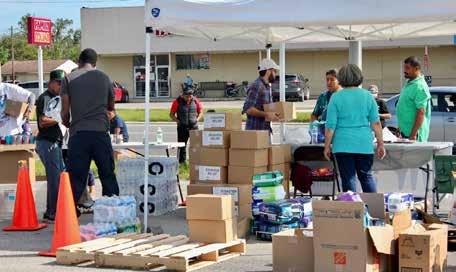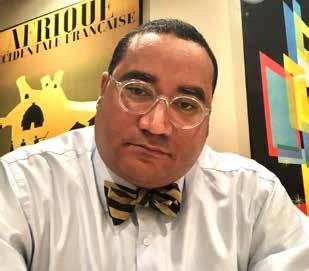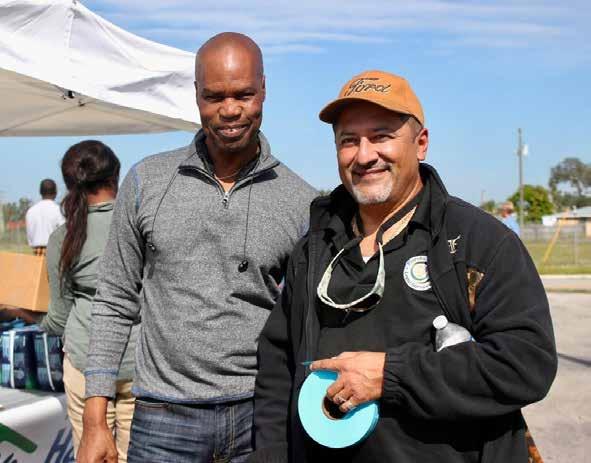
3 minute read
Florida Rural Legal Services : A LEGAL VOICE for the voiceless
Nearly 60 years ago, a Great Society effort to fight poverty and racial injustice by providing free civil legal aid to indigent families in South Florida as well as migrant workers statewide birthed the South Florida Migrant Services.
In the ensuing decades, the private nonprofit now known as Florida Rural Legal Services has greatly expanded its reach, with offices in Belle Glade, Fort Myers, Fort Pierce, Immokalee, Lakeland, Punta Gorda and Riviera Beach. Its staff of 70 includes 31 attorneys serving residents in 14 counties. Nearly half of those attorneys work in the Lee County office, led by managing attorney Michelle Trunkett.
While legal advocacy on behalf of seasonal farmhands and other migrant workers remains a core FRLS function, the agency also handles a wide array of legal issues for those who otherwise couldn’t afford to pay for private counsel, from landlord-tenant disputes and evictions (which surged during the pandemic) to representing domestic violence victims seeking orders of protection or engaged in child custody disputes.
A more recent challenge: the region-wide hardship posed by Hurricane Ian, which not only created a surge in demand from displaced disaster survivors but also tore off part of the roof of the FRLS office at 3210 Cleveland Ave.
A subsequent burst water pipe flooded the office, postponing a return until this spring while staff worked remotely. A steady stream of clients, meanwhile, has created a comparable flood of demand for help.
“For most of our clients, this is nowhere near the end,” said Peter Dennis, an FRLS staff attorney who oversees pro-bono efforts in the Fort Myers office. “Many are still struggling with the same things they were dealing with the day after the hurricane hit.”
Dennis’ own career arc is an apt illustration of the lifelong commitment to public service typically found among civil legal aid practitioners.
The son of a Liberian father who taught at U.S. universities and an American mother, the Fort Myers High School and New York University School of Law graduate spent several years working for an international human rights organization in New York, eventually returning home to join the Lee County Public Defender’s Office and then work in private practice in Fort Myers.
“The United Nations didn’t have a post here in Lee County,” joked Dennis. “So, I looked at different ways to serve people.”
As the local Private Attorney Involvement (PAI) coordinator, Dennis sees the generosity of his Lee County colleagues firsthand — even as many grapple with their own post-Ian recoveries at home and work.

“We really do depend on the legal community here in Lee County,” he said. “And they have always stepped up in a big way. This is an extremely generous Bar when it comes to their willingness to give their time and resources.”
Examples of successful FRLS outcomes for clients abound. In one case, a 52-year-old Lee County man and father of two who had his monthly Social Security disability benefits terminated turned to the clinic for help.
It took four tries — three disability hearings, three unfavorable decisions — before an administrative law judge ruled in the favor of Michael, the client, who worked as a glass installer for much of his working life before becoming disabled. The judge awarded nearly $73,000 in back pay to the man, along with restoring his $1,400 monthly disability payments.
In another case, a Polk County labor contractor was sentenced to nearly 10 years in federal prison late last year as part of a U.S. Department of Labor investigation into human trafficking that relied on information provided by FRLS along
Racial justice is at the core of the FRLS mission: its website calls racial equity “ingrained in our ongoing fight to curtail the systems that cause circular poverty and obstacles to justice.” In the case of civil legal aid, those obstacles often start small — a suspended driver license, a denial of veteran healthcare benefits —before snowballing into legal odysseys that those without financial resources usually are unable to navigate on their own.

“All of these things that may seem mundane can have a major effect on someone who is economically insecure,” Dennis said. “We live in a community that really represents some extremes. We have areas of extreme poverty alongside areas of extreme wealth, separated by little more than railroad tracks.”
“It is in many ways still a divided community. But much progress has been made,” Dennis added. “But in order to continue making progress, we need to make sure that people have equal access to the law.”
Attorneys interested in volunteering at Florida rural Legal Services can contact Peter Dennis at 239-334-4554 ext. 4149 or visit www.frls.org/pro-bono. A list of available cases can be found at www.thefloridabarfoundation. org/florida-pro-bono-matters/. The organization also welcomes non-lawyer volunteers to assist with administrative office functions.
To apply for services, visit www.frlsoi.legalserver.org/ modules/matter/extern_intake. php?pid=129&h=daa817& or call 1-888-582-3410 from 8:30 a.m. to 5 p.m. (general public) or 855-771-3077 (farmworkers)






